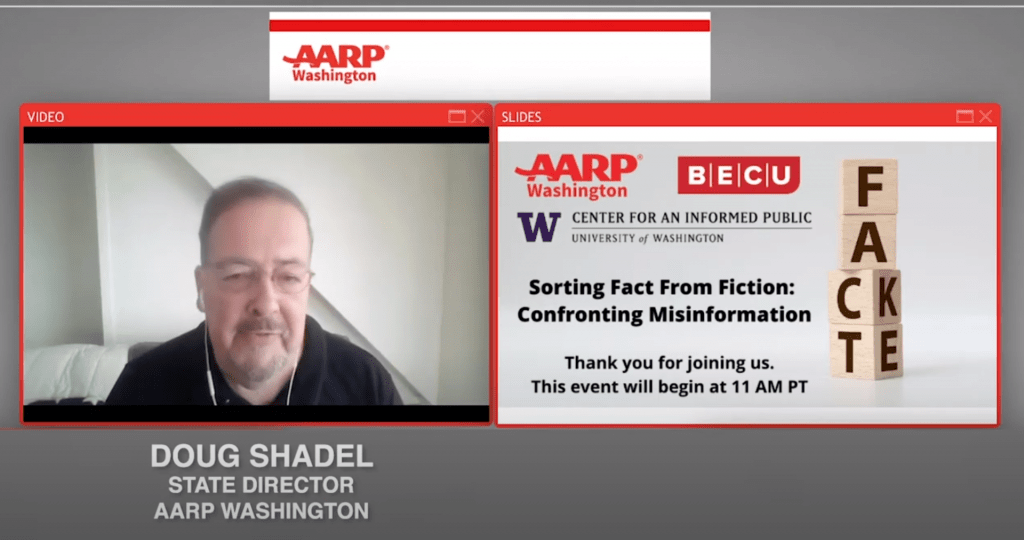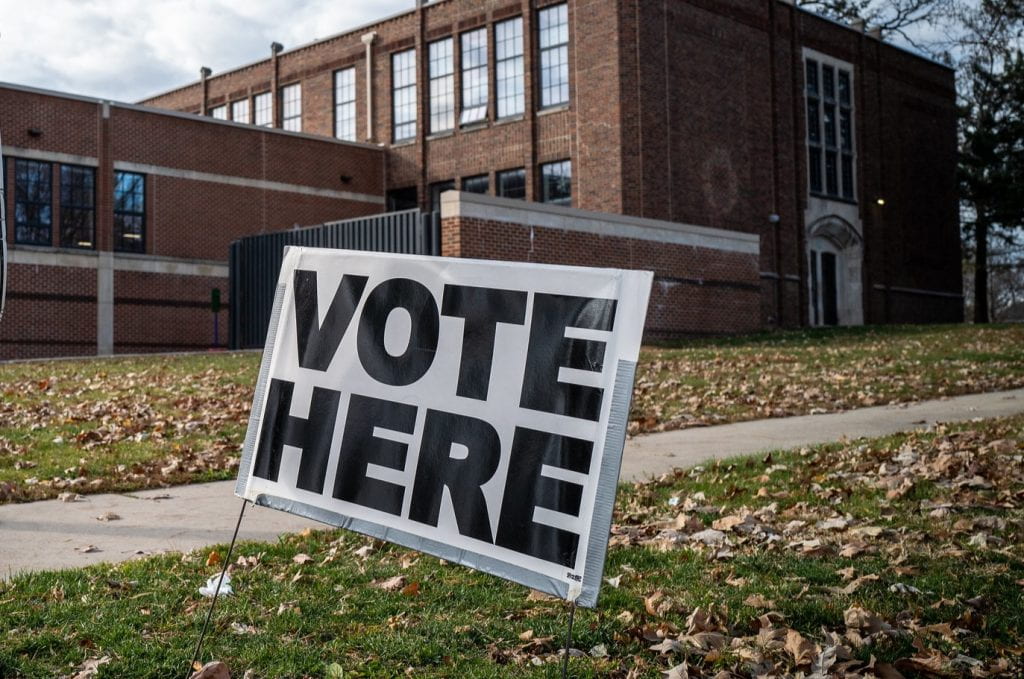By Elliot Trotter
Amid a continued onslaught of misinformation online, older adults often face an added challenge of identifying truth and spotting scams in digital spaces, texts and nightly news. To Center for an Informed Public director Jevin West, a partnership with AARP Washington seemed like a perfect opportunity to reach retired adult populations across the state and empower them to contribute directly to some of the CIP’s research efforts.
“It was a collaboration made in heaven,” said West, an associate professor at the University of Washington Information School. “The design of the Center was to spend time collaborating with civic society organizations. AARP is the absolute perfect one because it’s a demographic that we don’t always have access to. When thinking about misinformation, it’s important to customize our research and our teaching for these different age groups, because they have all sorts of different experiences.”
Conversations with Doug Shadel, director of AARP Washington, led to the creation of an online lecture series that kicked off in September. The Sorting Fact from Fiction series was sponsored by BECU, a member-owned credit union based in Washington, and AARP Washington developed in partnership with the CIP. The four-event lecture series had tremendous success seeing thousands of participants register and tune in live. Featuring speakers like West, cybersecurity expert Brett Johnson, and Snopes.com founder David Mikkelson, the series covered fact-checking tips, how to avoid scammers and spotting misinformation.
In October, KING-5’s “New Day Northwest” featured a Sorting Fact from Fiction special program, developed in partnership with the CIP and AARP Washington, featuring interviews with West and CIP co-founder Kate Starbird, who shared misinformation awareness tips and other insights. The program, which aired on KING-5 in Seattle and NBC local stations KXLY in Spokane and KGW in Portland, saw nearly 1.6 million combined impressions and an additional 1.2 million impressions on Facebook. The presentation is currently available on a KING-5 webpage.
With so much excitement surrounding the partnership, West and Shadel concurrently launched the CIP/AARP Washington Factcheck Ambassador program. After participating in an initial training session, ambassadors submit tips of mis- and disinformation that they find online, in newspapers or elsewhere. CIP researchers then vet tips based on existing research and correspond directly with ambassadors, providing suggestions for how to respond. Ambassadors are also able to connect with CIP volunteers during office hours that meet three times weekly.

AARP Washington director Doug Shadel presents at September’s ‘Sorting Fact From Fiction’ online event.
To date, hundreds of AARP members have participated in Factcheck Ambassador training which teaches participants how technology makes it easy to create false images that appear real and how to spot misinformation.
During a heated U.S. election, ambassadors set their sights on election-related misinfo. “We were looking for findings related to fraud, participation, interference, procedural interference or anything that was meant to undermine the results of the or trust in the results of the election,” UW iSchool graduate assistant Stephen Prochaska, who has managed the Factcheck Ambassador program for the CIP, explained in an interview.
Factcheck ambassadors have also submitted over 70 tips, many of which became actionable research seeds, to the Election Integrity Partnership, a nonpartisan consortium of disinformation and misinformation researchers launched this summer by the CIP, Stanford Internet Observatory, Graphika and the Atlantic Council’s DFR Lab, that identified and tracked voting-related dis- and misinformation in the 2020 U.S. elections.
Prochaska sees this “collective sensemaking” as hugely valuable to research organizations like the CIP. “There are a lot of people that want to help but don’t know what to do. And this gives them an opportunity to do something,” Prochaska said.
West quickly recognized the devotion and attentiveness of the volunteers. “Our ambassadors understand that one of the most central problems for us right now is misinformation and disinformation,” said West. “They see it and they’re really motivated to help out.”
Jan Pelley, who has participated in the Factcheck Ambassador program, said in an interview that she’s enjoyed the training and submission process. “This has helped me become more discerning about what I’m reading on websites,” said Pelley. “[I feel] like I’m making a small contribution to a UW team that is trying to bring truth to internet websites that millions of people may potentially read.”
Prochaska also believes the impact of training volunteers has a far-reaching community impact, “Moving forward, what this will be really useful for is not just educating themselves, but their families and their communities,” Prochaska said. “As ambassadors begin to really understand misinformation, then they’ll be able to start making sure that people that they know also understand it.”
As the U.S. election draws to a conclusion, in coming months the Factcheck Ambassador program will shift its focus towards public health and misinformation about COVID-19 and vaccines. West sees tremendous potential for the program’s future with the possibility of expanding to other AARP state organizations.
“It’s a long-term relationship building resources that can get into the hands of millions of AARP members,” said West. “AARP is a critical civic society organization in the state of Washington. In working with them, they’ll teach us probably as much as we’ll teach them. And that to me is a good partner.”




